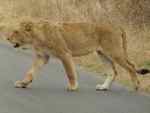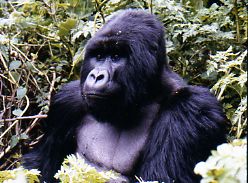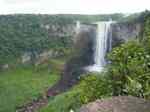Interesting Mountain Gorilla Facts
COVID slowed us down for a couple of years, and now a few health issues challenge us. We're still traveling if not writing about it quite so much. Our goal in 2022 was get to all seven continents in one year... and we did it.
Going forward health issues may not allow us to travel. No one can take away those memories though. We hope all of you are well and staying safe... and that you find some inspiration here for YOUR future travels.
Want Mountain Gorilla facts?
We gave you our personal observations.
Our guest writer Irina knows a fair amount about Mountain Gorillas and Tropical Rainforest Animals in general.
We shared our story about Ndume, "our" silverback gorilla.
Irina Shares Mountain Gorilla Facts
Mountain Gorillas inhabit the mountainous tropical rainforests of Eastern and Central Africa. They live in Rwanda, Uganda and the Democratic Republic of the Congo.
Though mountain gorillas are large and powerful...
...they are also very gentle and affectionate...
...and not aggressive towards people unless improperly disturbed.
These animals are vegetarian (they eat shoots, leaves, fruit).
They provide important ecological services in
their rainforest communities by dispersing the seeds of fruits and
plants that they consume.
Mountain gorillas cannot swim but they can use tools to solve problems. For example, they have been seen using a tree branch as a bridge to cross a patch of muddy ground.
Gorillas are social animals, and live in groups of 6 to 30 individuals, with a home range of 2 – 40 km (while ranges of different groups may overlap).
The female gorilla gives birth once every 4 years, usually to a single baby but sometimes to twins.
These animals are famous for their repertoire of calls which include grunts, hoots, the roar as well as the chest beating ritual.
Mountain gorillas are among our closest relatives – they share at least 97% - 98% of their DNA with the human race.
Endangered Gorillas Need Conservation Help
Mountain Gorillas have become an extremely endangered gorilla species, mainly due to human-induced causes: habitat loss, commercial hunting / poaching, diseases as well as military conflicts.
There are now only around 600 – 640 individuals left in the wild.
The conservation program for mountain gorillas that was launched at the end of the 1970s – beginning of the 1980s has been quite successful in stemming the total demise of these animals.
In addition to all the current threats faced by mountain gorillas, their reproduction rates are very slow....
And this slow reproductive rate makes gorilla conservation efforts even more important than ever before.
If you want to find out more about tropical wildlife and rainforest conservation issues, please feel free to visit our Tropical Rainforest Animals website.
Irina
Thanks for sending this along Irina....
Travelers need all the information they can get.
As a post script, we should tell you that since she sent this, Irina has shut her website down and we cannot send you there for more mountain gorilla facts.
Conservation efforts seem to be helping with Mountain Gorillas though. From what we've heard, their numbers are slowly increasing.
And though it's been several years since we went our our gorilla trek, people we have talked to who have been more recently have been just as inspired by these amazing animals as we were.
Many Africa Animals Are Endangered!
Rhinos, Elephants and More
We just wanted to add that gorillas are not the only animals in Africa that are endangered.
Conservation efforts are crucial if we are to save rhinos, elephants, cheetahs and others. There are many groups that work at this.
Please contribute in any way you can.... even if it's only getting the word out so more people speak up.
We feel we have been very lucky to go on the safaris we write about. We've seen gorillas and rhinos and elephant...
And we've been lucky enough to visit with "cheetah ambassadors" in Namibia. We hope these amazing animal can survive far into the future.
Thanks for letting us lecture a bit!
Happy travels... even if you don't travel the world... just remember that life is a journey... embrace and enjoy it! Judy and Mark
Curious about what else we've written about? Search our site for a destination or travel tip.
But... We'd love to have you share this page or comment on it…
Thanks, Judy and Mark
Return to Mousetours Mountain Gorillas
International Travel Health Vaccinations Is the Water Safe? Do You Need Malaria Pills?
Pepto-Bismol for Travel Health
Passports and Visas Custom Tour Planning List
return from Mountain Gorilla Facts to MouseToursTravels Home Page
Timely Tips
Summer Vacation
Travel is fun in the Northern summer... but don't neglect the Southern Hemisphere at this time of year.
Yes, it's winter in South Africa, but that's their dry season. It's a good time to travel there.

Sometimes you need to watch rain patterns instead of just seasons to figure the best time to travel...
Whether you're taking a road trip close to home or traveling abroad...
Whether it's summer or winter in your part of the world...
the way you pack can make it all more pleasurable.
Check out all our Packing Lists and Tips.
Need travel ideas?
Things to See in Europe
Africa Calls!
Travel In America
Don't just dream about it...
Start making plans!
Custom Tour Planning List
International Travel Planning Tips
Foreign Is Fun - Not Scary!
Get Your Passports and Visas
And Expect Good Things
There Are Tourist Angels
Search
Search MouseToursTravels
Travel questions or destination info?
Find our answers faster...
Translate
We want you to feel comfortable out in the world and on our pages - so surf away in your own language...
Updated Tips & New Travel Stories
-
2022 Travels To All Seven Continents
After COVID, all seven continents in one year was a worthy goal for our 2022 travels.. -
2021 Travels - Another COVID Year?
Our 2021 travels were only domestic. COVID kept us close home. Road trips and a cautious flights but still fun. -
2020 Travels - What Travels?
Our 2020 travels were slim. COVID kept us home too. One trip to the Three Guyanas, but dreaming of travel next year.
Two Ways To Like Us!
Like Our Site Top Left
Like Our Fanpage Below
Thank You!
Navigate Our Site
What We’ve Written On Africa
So Far
African Dream List
African Tented Camps
Botswana Adventure
Collect Passport Stamps In South Africa
Ethiopia
Madagascar
Madagascar's Tsingy
Our Madagascar ItinerarY
Mountain Gorilla Facts
"Our" Silverback Mountain Gorilla
Rwanda Mountain Gorillas
South Africa
Timbuktu or Dogon Country?- Mali
Other Travels Include Africa
2008 Travels
2011 Travels
2013 Travels
2019 Travels
For A Little Humor





New! Comments
Have your say about what you just read! Did it help with your travel planning and preparation? Eager to leave on that next vacation? Please leave your tips or comments in the box below.